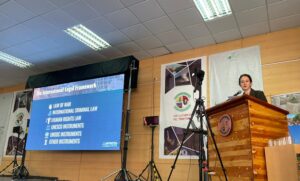In a recent Al Jazeera article, Executive Director Tess Davis underscored the broader implications of the pending Prakhon Chai repatriation, pointing to an enduring colonial mindset lingering in parts of the art world.
Looted from northeastern Thailand more than half a century ago, the “Prakhon Chai Hoard” includes over 100 bronze statues looted in the 1960s. Following escalating investigations into their whereabouts, the Thai government is calling for Western museums to interrogate their collections for looted artifacts and return them. The San Francisco Asian Art Museum is the first and only American museum to restitute its Prakhon Chai artifacts. With 14 more known pieces in other U.S. museums, the battle is far from over.
Met with calls for repatriation, many Western museums assume—mistakenly—that they are better carers, owners, custodians of the material past. However, as Tess says,
“These antiquities were cared for by [their] communities for centuries, in some cases for millennia, before there was … a market demand for them, leading to their looting and trafficking.”
The infamous art dealer Douglas Latchford, emerging research suggests, likely began his decades-long plunder of Southeast Asia in Thailand. Amidst ongoing investigations into Latchford’s pillage of Cambodian temples, the AC has been pleased to help bring his crimes to light, raising awareness on podcasts, through Op-Eds, on television, and in the global press.
As more museums face demands for transparency and ethical stewardship, the Antiquities Coalition welcomes this return as a hopeful step forward—and a reminder that true custodianship begins with justice.
Read the full article from Al Jazeera, here.
Dive deeper into Latchford’s criminal network, here.
Learn more about Cambodia’s recovery of its stolen heritage, here.










